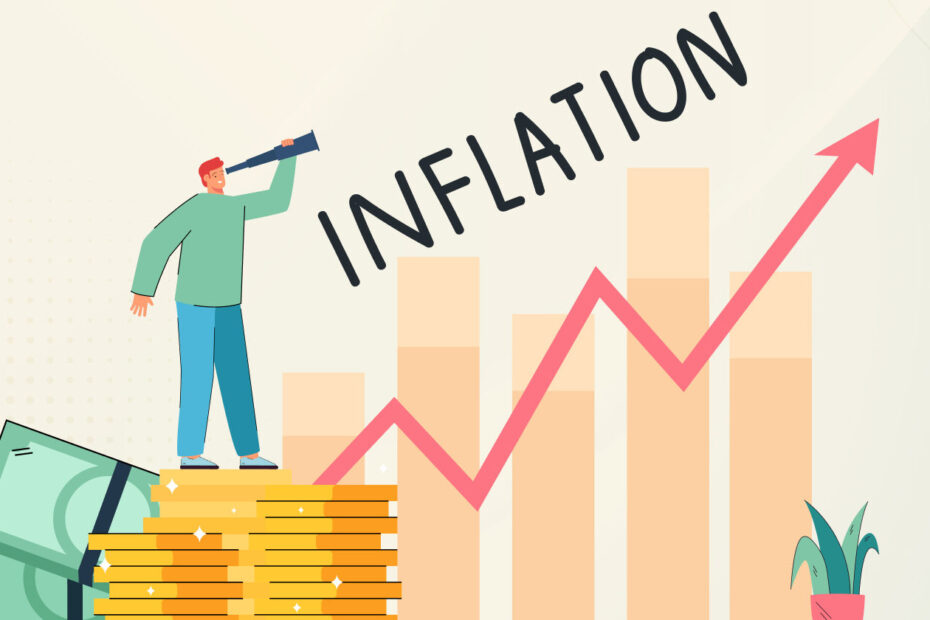Inflation is a subtle force that steadily reduces the purchasing value of your money. As prices grow, the dollar you have now will buy fewer products and services tomorrow. For investors, this means that inflation can gradually erode the value of your portfolio if you are not prepared. However, with the appropriate tactics, you may protect and even increase your money during an inflationary period.
Understanding Inflation’s Impact on Investments
Inflation is defined as an overall increase in prices and a commensurate decline in the purchasing power of money. For example, with a 3% yearly inflation rate, something that costs $100 today will cost $103 the next year. Over time, even minor inflation can drastically erode the real worth of your savings and investments.
How Inflation Impacts Different Types of Investments:
Stocks – Companies can typically pass on increasing expenses to customers, so protecting their profit margins. However, not all equities react similarly to inflation. Growth stocks, for example, may suffer if rising interest rates—which frequently accompany inflation—decrease the present value of future earnings. Companies in industries such as energy and consumer goods, which can boost prices in response to inflation, may fare better.
Bonds – are particularly susceptible to inflation. Fixed interest payments from bonds lose real value when inflation rises, meaning the money you receive has less purchasing power. The impact is most severe for long-term bonds, which lock in interest rates for extended periods of time. Treasury Inflation-Protected Securities (TIPS) are a form of bond designed to protect against inflation by modifying the principal value in response to changes in the Consumer Price Index.
Real estate – is widely regarded as an effective inflation hedge. Property values and rental revenue often rise with inflation, preserving or even increasing the real worth of real estate assets. Real estate investment trusts (REITs) are businesses that own, operate, or finance income-generating and they can also provide a way to gain exposure to the real estate market without directly owning property.
Commodities – such as gold, oil, and agricultural products typically fare well during inflationary periods. Commodities are a popular hedge against inflation since their prices rise in tandem with those of goods. Investing in commodities directly or through commodity-focused exchange-traded funds (ETFs) can help protect against rising prices. Holding big sums of cash during inflation is not recommended.
Cash – loses value when inflation rises, reducing your purchasing power over time. While it is vital to keep some cash on hand for liquidity, having too much cash might deplete your worth in an inflationary economy.

Strategies for Hedging Against Inflation
To protect your financial portfolio against the negative effects of inflation, consider combining these strategies:
Diversify among asset classes, including equities, bonds, real estate, and commodities. This strategy lowers total risk while increasing the likelihood that some assets will perform well even if others do not.
Invest in Treasury Inflation-Protected Securities (TIPS): TIPS alter their principal value depending on changes in the Consumer Price Index (CPI), allowing your investment to preserve purchasing power over time.
Consider Dividend Growth Stocks: Companies that routinely raise dividends can act as a hedge against inflation. Increasing dividend payouts can help offset the loss of purchasing power.
Include Real Assets: Assets such as real estate and commodities usually appreciate with inflation. You can invest in them without purchasing physical properties or commodities via real estate investment trusts (REITs) and commodity-focused exchange-traded funds (ETFs).
Use floating-rate bonds: they have interest rates that fluctuate with market conditions. Interest payments climb with inflation, making them less inflation-sensitive than fixed-rate bonds.
Conclusion
Inflation is a powerful force that, if not managed properly, can devalue your investments. Understanding how inflation impacts different asset classes, as well as including inflation-resistant investments like as TIPS, real estate, and commodities into your portfolio, can help you safeguard and even build your wealth during times of inflation. Diversification and strategic asset allocation are critical for ensuring that your portfolio remains resilient, regardless of how inflation changes.
